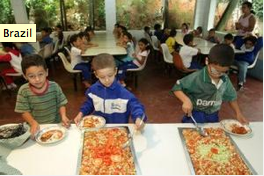In February, Brazil agreed to provide US$2.3 million to the United Nations to fund local food programs in Ethiopia, Malawi, Mozambique, Niger, and Senegal, five countries that have experienced moderate or severe food crises in recent years. Brazil will also contribute advice and expertise to the programs because it has been operating its own local food purchasing program for the last 10 years.

The Food Acquisition Program (known in Brazil as PAA) is a cornerstone of Brazil’s Zero Hunger Strategy, implemented in 2003 under Lula da Silva’s presidency. The Zero Hunger Strategy has spurred similar programs in other countries, most recently in South Africa, which launched its Food for All campaign in December 2011.
PAA funds local organizations including community kitchens, hospitals, rehabilitation centers, and schools, as well as individual family homes, to buy fruits, vegetables, and animal products from smallholder farmers in their region. The program requires a high level of coordination between federal and state governments, municipalities, farmers’ organizations, and social service organizations. Since it began in 2003, PAA has spent more than US$2 billion on 3.1 million tons of food, which has then been distributed by 25,000 organizations throughout Brazil to feed around 15 million people.
According to Brazil’s Ministry of Social Development and Fight Against Hunger, PAA was started with the twin objectives of increasing citizens’ food and nutritional security and strengthening the position of family farms in society. The program aims to reduce malnutrition and improve social inclusion of disadvantaged groups, especially among rural populations, whose problems are often invisible to state or federal governments.
The program buys produce from around 160,000 family farmers throughout Brazil each year. Because PAA guarantees a minimum payment to participating farmers each year, as well as an insurance program for unforeseen events like drought or crop diseases, farmers have much more stability and security in their lives. PAA also allows farmers to move away from specialization and commodity production—many Brazilian farmers have been forced to grow only one crop, such as soybeans, in order to satisfy the demands of global food markets. Instead, PAA encourages a wider variety of nutritious and often indigenous crops. By diversifying their crops, farmers are less vulnerable to a crash in the price of a single crop, or a drought that wipes out that crop.
PAA also rewards farmers financially for using environmentally friendly growing practices, including sourcing their fertilizer and other inputs locally, protecting local biodiversity, or practicing organic and sustainable agriculture. Farmers’ incomes have also increased because they now have a stable buyer and because food brokers and other middlemen no longer hold a monopoly on the food market, meaning farmers get higher prices for their crops. Farmers have also established co-operatives to help them assert their rights and access new markets, according to the United Nations International Policy Centre for Inclusive Growth.
Because many of the family farmers selling to PAA live in remote rural areas that often lack formal social services, the program has fostered a higher level of social inclusion than exists in many wealthier or more-developed countries. By giving disadvantaged citizens a voice in such a basic human right as what food they eat, and allowing farmers to profitably feed the communities in which they live, Brazil’s PAA offers an excellent example of a functional and sustainable food system.
By Laura Reynolds

Danielle Nierenberg, an expert on livestock and sustainability, currently serves as Project Director of State of World 2011 for the Worldwatch Institute, a Washington, DC-based environmental think tank. Her knowledge of factory farming and its global spread and sustainable agriculture has been cited widely in the New York Times Magazine, the International Herald Tribune, the Washington Post, and
other publications.
Danielle worked for two years as a Peace Corps volunteer in the Dominican Republic. She is currently traveling across Africa looking at innovations that are working to alleviate hunger and poverty and blogging everyday at Worldwatch Institute’s Nourishing the Planet. She has a regular column with the Mail & Guardian, the Kansas City Star, and the Huffington Post and her writing was been featured in newspapers across Africa including the Cape Town Argus, the Zambia Daily Mail, Coast Week (Kenya), and other African publications. She holds an M.S. in agriculture, food, and environment from Tufts University and a B.A. in environmental policy from Monmouth College.








